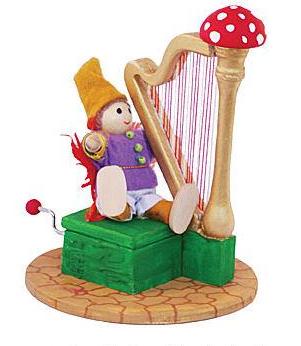As told to me this story runs somewhat thus: A company of fairies which frequented Cader Idris were in the habit of going about from cottage to cottage in that part of Wales, in pursuit of information concerning the degree of benevolence possessed by the cottagers. Those who gave these fairies an ungracious welcome were subject to bad luck during the rest of their lives, but those who were good to the little folk became the recipients of their favour. Old Morgan ap Rhys sat one night in his own chimney corner making himself comfortable with his pipe and his pint of cwrw da. The good ale having melted his soul a trifle, he was in a more jolly mood than was natural to him, when there came a little rap at the door, which reached his ear dully through the smoke of his pipe and the noise of his own voice–for in his merriment Morgan was singing a roystering song, though he could not sing any better than a haw – which is Welsh for a donkey. But Morgan did not take the trouble to get up at sound of the rap; his manners were not the most refined; he thought it was quite enough for a man on hospitable purposes bent to bawl forth in ringing Welsh, ‘Gwaed dyn a’i gilydd’ Why don’t you come in when you’ve got as far as the door?’ The welcome was not very polite, but it was sufficient. The door opened, and three travellers entered, looking worn and weary. Now these were the fairies from Cader Idris, disguised in this manner for purposes of observation, and Morgan never suspected they were other than they appeared. ‘Good sir,’ said one of the travellers, ’we are worn and weary, but all we seek is a bite of food to put in our wallet, and then we will go on our way.’ ‘Waw, lads! is that all you want? Well, there, look you, is the loaf and the cheese, and the knife lies by them, and you may cut what you like, and fill your bellies as well as your wallet, for never shall it be said that Morgan ap Rhys denied bread and cheese to a fellow creature.’ The travellers proceeded to help themselves, while Morgan continued to drink and smoke, and to sing after his fashion, which was a very rough fashion indeed. As they were about to go, the fairy travellers turned to Morgan and said, ‘Since you have been so generous we will show that we are grateful. It is in our power to grant you any one wish you may have; therefore tell us what that wish may be.’
‘Ho, ho!’ said Morgan, ‘is that the case? Ah, I see you are making sport of me. Wela, wela, the wish of my heart is to have a harp that will play under my fingers no matter how ill I strike it; a harp that will play lively tunes, look you; no melancholy music for me!’ He had hardly spoken, when to his astonishment, there on the hearth before him stood a splendid harp, and he was alone. ‘Waw!’ cried Morgan, ‘they’re gone already.’ Then looking behind him he saw they had not taken the bread and cheese they had cut off, after all. ‘’Twas the fairies, perhaps,’ he muttered, but sat serenely quaffing his beer, and staring at the harp. There was a sound of footsteps behind him, and his wife came in from out doors with some friends. Morgan feeling very jolly, thought he would raise a little laughter among them by displaying his want of skill upon the harp. So he commenced to play – oh, what a mad and capering tune it was! ‘Waw!’ said Morgan, ‘but this is a harp. Holo! what ails you all?’ For as fast as he played his neighbours danced, every man, woman, and child of them all footing it like mad creatures. Some of them bounded up against the roof of the cottage till their heads cracked again; others spun round and round, knocking over the furniture; and, as Morgan went on thoughtlessly playing, they began to pray to him to stop before they should be jolted to pieces. But Morgan found the scene too amusing to want to stop; besides, he was enamoured of his own suddenly developed skill as a musician; and he twanged the strings and laughed till his sides ached and the tears rolled down his cheeks, at the antics of his friends. Tired out at last he stopped, and the dancers fell exhausted on the floor, the chairs, the tables, declaring the diawl himself was in the harp. ‘I know a tune worth two of that,’ quoth Morgan, picking up the harp again; but at sight of this motion all the company rushed from the house and escaped, leaving Morgan rolling merrily in his chair. Whenever Morgan got a little tipsy after that, he would get the harp and set everybody round him to dancing; and the consequence was he got a bad name, and no one would go near him. But all their precautions did not prevent the neighbours from being caught now and then, when Morgan took his revenge by making them dance till their legs were broken, or some other damage was done them. Even lame people and invalids were compelled to dance whenever they heard the music of this diabolical telyn. In short, Morgan so abused his fairy gift that one night the good people came and took it away from him, and he never saw it more. The consequence was he became morose, and drank himself to death–a warning to all who accept from the fairies favours they do not deserve.


